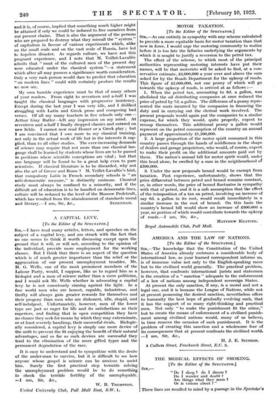MOTOR TAXATION.
[To the Editor of the SPECTATOR.] SrR,—As one entirely in sympathy with any scheme calculated to provide a more equitable basis for motor taxation than that now in force, I would urge the motoring community to realize before it is too late the fallacies underlying the arguments by which it is sought to justify a reversion to the petrol tax.
The effect of the scheme, to which most of the principal authorities representing motoring interests have put their names, will be that motorists will be asked to find, at a con- servative estimate, £2,000,000 a year over and above the sum asked for by the Roads Department for the upkeep of roads. This figure of £2,000,000, not one penny of which will go towards the upkeep of roads, is arrived at as follows :— 1. When the petrol tax, amounting to 6d. a gallon, was abolished the oil distributing companies at once reduced the price of petrol by 7d. a gallon. The difference of a penny repre- sented the costs incurred by the companies in financing the duty and in carrying out the clerical work involved. The present proposals would again put the companies to a similar expense, for which they would, quite properly, expect to recoup themselves. This additional penny a gallon would represent on the petrol consumption of the country an annual payment of approximately £1,200,000.
2. A large proportion of the motor spirit consumed in this country passes through the hands of middlemen in the shape of dealers and garage proprietors, who would, of course, expect to make their profit on the additional amounts paid out by them. The nation's annual bill for motor spirit would, under this head alone, be swelled by a sum in the neighbourhood of £500,000.
3. Under the new proposals benzol would be exempt from taxation. Past experience, unfortunately, shows that the price differential between petrol and benzol remains constant, or, in other words, the price of benzol fluctuates in sympathy with that of petrol, and it is a safe assumption that the effect of the reimposition of a tax on petrol, involving an increase of say 6d. a gallon in its cost, would result immediately in a similar increase in the cost of benzol. On this basis the country's benzol bill would show an increase of 2300,000 a year, no portion of which would contribute towards the upkeep of roads.—I am, Sir, &c.,


































































 Previous page
Previous page